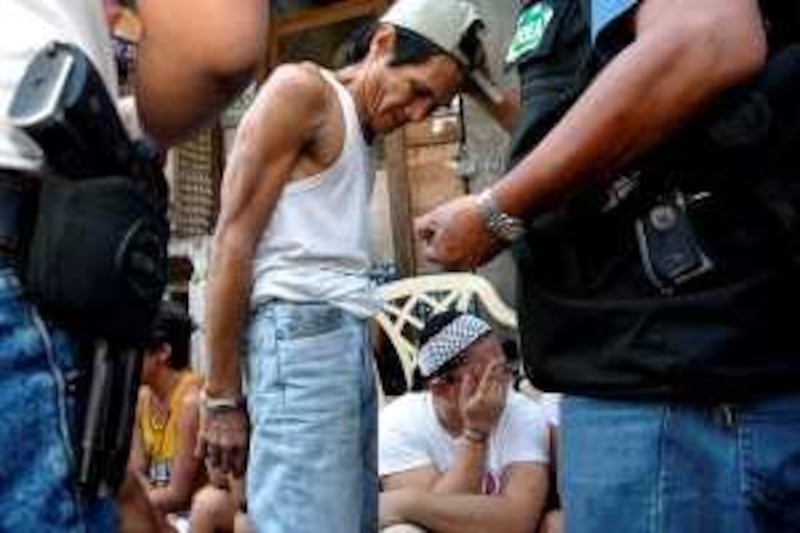MANILA // The sprawling slums around Taguig in southern Manila are home to some of the city's biggest drug lords. For a couple of hundred pesos, junkies can buy enough "shabu" (crystal methamphetamine hydrochloride) for a few hits and then it is back to the streets for more. There is never a shortage in supply.
"That's just the way it is," said "Jason" (not his real name), a 27-year-old undercover officer with the Philippine Drug Enforcement Agency (PDEA). "It's a war without end," he said as he prepared his agents for another drug bust. With youthful good looks, long black hair, a silver earring, sunglasses and white cap, Jason looks more like a pimp than a hard-nosed undercover narcotics agent. For more than a year now he has been tracking one of Taguig's more notorious dealers - a woman in her 40s said to be connected to one of the top three drug lords in the area.
"This sort of operation is always difficult," he said inside the PDEA compound in Quezon City. "It takes time building contacts and every piece of information has to be validated. You also run the risk of losing contacts." In this operation alone Jason has lost two contacts he had inside Taguig's murky drug world. "I am pretty sure they have been killed." he said. "The way the drug lords kill informers is to put them inside a steel drum, alive, and fill it full of cement then dump them in a waterway. I am sure one of my people was killed because I kept on getting calls from someone saying, 'I'm going to kill you'."
At least 12 agents, men and women, were involved in the most recent stage of the operation, an attempted fake drug deal "sting" that took place early this month as the thermometer neared the 40° mark. On a whiteboard Jason mapped out the area where the operation would take place outside a busy shopping mall. There were two teams of Swat officers from PDEA in two vans armed with Baby Armalite assault rifles and wearing bulletproof vests. The other officers were not armed because of a gun ban throughout the country in the run-up to the May 10 elections.
"That is a real problem for us because we know these guys will probably be armed or, like us, have people nearby carrying guns," Jason said before the operation. Briefing over and with agents assigned tasks, the group moved out in three unmarked vehicles for the 45-minute drive to the mall. As the hours ticked by, Jason and his companion started to wonder if the dealer would show up. The other agents were placed well back, waiting, smoking and cracking jokes.
As dusk fell a woman approached Jason's car and the deal was moved inside the mall. Jason and his companion, also a PDEA agent, followed. An hour later, Jason called off the operation. At a petrol station a few kilometres away he told his crew: "They were playing with us. They wanted to do the deal in a bar they owned in the back of the mall. It was too dangerous and I would assume they had guns and we didn't ? I don't like walking into a situation like that without a gun."
Jason was philosophical: "OK, we didn't get them today ? but there is always tomorrow." Jason is one of 600 agents with the PDEA, which was established in 2002 to be the country's leading anti-drugs agency. The World Bank in a report last year on World Competitiveness described the PDEA as one of the least corrupt government agencies in the Philippines, which is a major achievement considering the Philippines is regarded as one of the most corrupt countries in Asia.
Much of the agency's success can be attributed to its director general, Dionisio Santiago, a retired general who was appointed by the president, Gloria Macapagal Arroyo, in 2006. Within a year he had attacked the mega-labs producing methamphetamine with spectacular success. "These labs could produce up to 300 kilos of shabu a day," he said. "What we are now finding is that the drug is being produced in kitchen labs in exclusive housing subdivisions, making detection harder; but production from this type of operation is around three kilos a day."
He said the agency had broken the back of transnational syndicates from China and Taiwan but new syndicates have moved in from Nigeria. This was confirmed recently by the US State Department in its 2010 International Narcotics Control Strategy Report. "In 2009, the [Philippine] government succeeded in enforcing counternarcotics laws, including the dismantling of numerous clandestine minilabs, assisting with the arrest of transnational drug traffickers in Malaysia, and arresting a member of an illegal drug syndicate who tried to smuggle methamphetamine to Guam," the report said.
"Corruption poses a problem in Philippine law enforcement, due to low pay and lack of training. However, law enforcement leadership takes the issue seriously and is attempting to address the problem." Gen Santiago said: "If we are to win the war on drugs, we have to have a clean agency ? corruption is not tolerated. "The big issue here is poverty. There is a lot of money in drugs and poor people know this. They turn to drugs as a way of making money. PDEA cannot tackle poverty, that is an issue for the government, but we are determined to fight the drug barons wherever they are in the Philippines."
@Email:foreign.desk@thenational.ae





